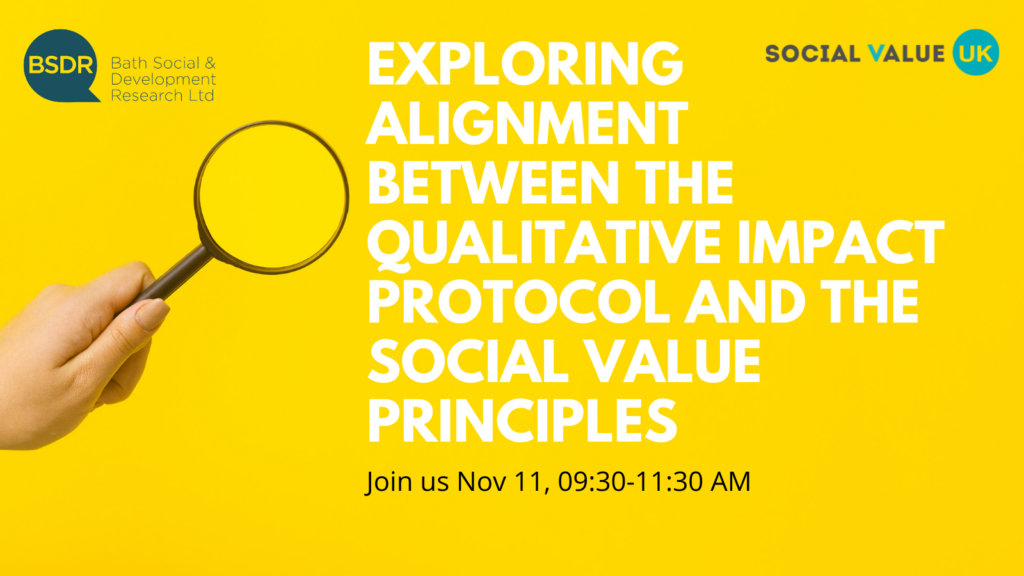
Posted 20th October 2021
Social Value UK and Bath Social & Development Research Ltd are delighted to announce the publication of a joint paper titled “Exploring alignment between the Qualitative Impact Protocol and the Principles of Social Value.” It sets down on paper the results of many interesting conversations and useful explorations of the alignment between the QuIP methodology and the principles we live by here at Social Value UK.
The paper is not a comparison of ‘like for like’ because QuIP is a research method and the Social Value principles are a ‘guiding force’ that underpin the choice of methods that practitioners make. The aim of the paper is therefore to help practitioners understand where QuIP fits within these guiding principles and how it could be used to complement other approaches – such as SROI for example. QuIP is an approach designed to collect information about what intended beneficiaries of social interventions perceive to have changed in relevant areas of their life and work, and the reasons for those changes. QuIP is not designed to determine the extent of change experienced, rather to explore to whom or what change can be attributed – focusing on causal mechanisms. This exploratory approach to collecting and visualising stories of change offers an opportunity to understand more about how and why change happens.
Fiona Remnant – Director at Bath SDR – says of our work together
“We are so pleased to be working with SVUK to understand how QuIP can be blended with other approaches used by UK-based practitioners. Our research is rooted in the field of international development where we work across more than 20 countries to help donors better understand how their interventions operate in complex contexts. We are continuously exploring new adaptations of the methodology in different contexts and this paper offers an opportunity to open up further learning and exchange with a new audience.“
There is plenty of detailed analysis of the points of convergence and divergence in the paper so we hope you will take time over a cuppa to digest it and think through what might be applicable or interesting for your own practice. I am a qualified QuIP evaluator and, as many of you will know, an active SROI practitioner too. I blend the QuIP approach into my own style of evaluation. A couple of the elements I have found most interesting and revealing in my own practice are…
- Causal mapping & the credibility of qualitative research: One of the first reasons I started to explore the QuIP was my engagement with the age-old debate around the credibility of qualitative research. If you join us for our upcoming workshop we’ll discuss this further (so I won’t set off on a long treatise here) but in SROI practice we always come up against people questioning the use of ‘subjective’ data and the validity of stakeholders’ own expressions of what matters to them. Causal mapping allows us to plot the findings from our qualitative research in a structured, transparent and engaging way. The raw data is accessible to anyone who wants to explore it and the process of understanding and plotting the causal chains is fully visible. This is a really positive way to engage stakeholders in our processes and our creation of meaning from data.
- Exploratory ‘blindfolding’ & attribution: In the process of conducting interviews I have used what is termed a ‘blindfolded’ or semi-blindfolded approach that encourages stakeholders to explore their own stories of change, using anchoring points in time but not organisation or intervention-specific questions. This has been a really insightful way to draw out useful information in response to those challenging attribution questions!
There is of course lots more to unpack here and we would love you to come along to our launch and discussion workshop on the 11th November.
Links to the paper itself are here and to Bath SDR here.
Written by Nicola Lynch – National Lead on Civil Society at Social Value UK